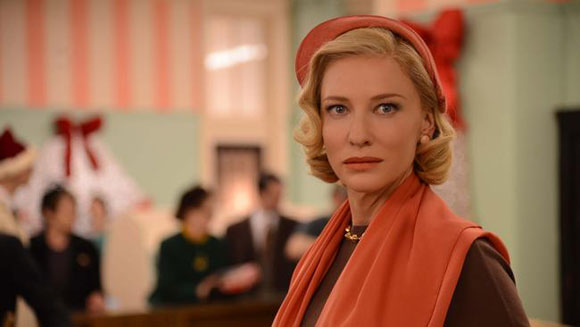A majestic love story “told through the prism of an America blinded by invisible enemies”. Martin Carr takes a look at Todd Haynes’ brilliant Carol…
 This rumination on the stifling repression of fifties Americana, is as impressive for its restraint as anything else on screen. Todd Haynes has crafted a film of delicate beauty which subtlety blurs gender distinctions, focusing without judgement upon Carol and Therese who fall in love through glances, veiled conversations and cavernous silences made up of everything they never say.
This rumination on the stifling repression of fifties Americana, is as impressive for its restraint as anything else on screen. Todd Haynes has crafted a film of delicate beauty which subtlety blurs gender distinctions, focusing without judgement upon Carol and Therese who fall in love through glances, veiled conversations and cavernous silences made up of everything they never say.
Cate Blanchett and Rooney Mara play off each other in scenes that crackle with chemistry, while their male ‘partners’ choose ignorance over admission. For Haynes this is a love story no less conventional than any other, told through the prism of an America blinded by invisible enemies. Women were still considered home makers first and foremost, while the idea of same sex coupling was up there with burning crosses on Pennsylvania Avenue.
Based on Patricia Highsmith’s novel The Price of Salt, there are some who have speculated upon its autobiographical elements. For Haynes and screenwriter Phyllis Nagy there were obviously things within Carol that struck a chord. Not least of which is the allegorical nature and inherent subtext which this film brings with it. Haynes not only passing comment on women of the fifties but skilfully drawing parallels between gender equality within a contemporary context. Challenging not only their right to be seen outside the umbrella of ‘homemaker and mother’, but also implying that men’s clubs themselves would soon be gone.

Outside of these prescient issues Haynes portrays Carol and Therese as people out of time. In their meetings there remains an intangible quality which eradicates those around them. Close ups of eye lines, hands and lips add intimacy and make these scenes tellingly voyeuristic. This has much to do with Blanchett and Mara’s commitment to the role, where each reacts to the other instinctively. Carol remaining an enigma throughout the film exuding a mystery and calmness which veils her inner turmoil. Whereas Therese is the innocent here giving in millimetres at a time to something which slowly consumes her. That this much is gleaned without dialogue merely advertises the performances as nothing short of exceptional. Elsewhere Carter Burwell and Saul Leiter bring other influences to the table, which enrich and complement in equal measure.
Burwell, who is a consistent Coen Brothers collaborator, brings the period to life with moments of incidental music and pieces drawn from the time. Meanwhile Saul Leiter’s style of photography involves shooting through glass, blurring faces, creating barriers and mingling colour schemes. This allows Haynes to apply his principles to the themes of class separation, gender delineation and isolation felt by our central characters.
For many this may be heavy stuff, dealing as it does with issues that are no less pertinent today than they were seventy years ago. In a more cynical time you would have said this was Oscar baiting material, given the presence of certain Miramax alumni in those credits. However this optimist is willing to put those notions aside in favour of praising the overall quality on display.
In a time of reconstituted rom-coms and reboots from tried and tested formulas, which lack both imagination and inspiration, Carol is that rare thing. A good story which is told with intelligence and consideration, both for its subject matter and wider world issues. An abject lesson in directorial economy and solid acting, which is almost as rare as the green-light used to get this thing made.



